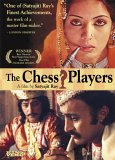| Reviews & Columns |
|
Reviews DVD TV on DVD Blu-ray 4K UHD International DVDs In Theaters Reviews by Studio Video Games Features Collector Series DVDs Easter Egg Database Interviews DVD Talk Radio Feature Articles Columns Anime Talk DVD Savant Horror DVDs The M.O.D. Squad Art House HD Talk Silent DVD
|
DVD Talk Forum |
|
|
| Resources |
|
DVD Price Search Customer Service #'s RCE Info Links |
|
Columns
|
|
|
Chess Players, The
(minor spoilers)
The film takes place in Lucknow, in the Kingdom of Oudh, where Mirza (Sanjeev Kumar) and Meer (Saeed Jeffrey, a delight as Billy Fish in The Man Who Would Be King and a familiar face in British films), wile away their days playing chess, much to the consternation of their wives. Mirza's wife, Khurshid (famed actress Shabana Azmi) feels neglected and during sex Mirza can't keep it up - he's too busy thinking about The Game. She steals his chess pieces in revenge, but he's so oblivious to her anger that he doesn't even suspect her. Meanwhile Meer's wife, Narfisa, has taken matters into her own hands, finding a lover in Meer's nephew. Meer is as clueless as his friend, even though the whole city knows about the affair.
On another front, the British government rationalizes its way out of a treaty previously signed with the Oudh government, and General Outram (Richard Attenborough, impressively subtle) makes preparations to formally depose King Wajid (Amjad Khan) and annex his kingdom for the additional wealth it will bring to the United Kingdom. No one wants bloodshed, and besides the British troops are largely composed of Oudh soldiers with arms paid for by the Oudhs anyway. Is a peaceful turnover possible?
Descriptions and reviews for The Chess Players are, in a word, weird. Neither plot summary in the IMDb, for example, really captures the essence of the film, which is completely without the bland straightforwardness of Attenborough's own Gandhi. Instead, The Chess Players mostly seems to be a gentle, slightly eccentric socio-political satire laced with irony and only a hint of sadness at the apathy that would lead to a century-long occupation by outsiders.
Unfazed by various setbacks, Mirza and Meer set out to find a way to continue playing chess, and the film takes on an almost Seinfeld air as they go to great lengths to make it happen. At one point they remember a chess board in their attorney's home. When they arrive he's on his deathbed, but as relatives mourn nearby they can't help but try to work in a game in an adjacent room.
Outram's utter refusal to view Wajid and his subjects through anything other than a condescending, British perspective provides entertainment of another sort. It has a kind of universal quality - one culture's complete unwillingness to even seriously attempt to understand another - but so many of the particulars mirror the current administration's approach to Middle Eastern affairs as to be quite revealing. As Weston (Tom Alter), Outram's Hindi-speaking, Oudh-sympathizing aide-de-camp tries to explain the appeal of Wajid's poetry and other cultural delicacies, Outram is minimally polite but essentially fidgety and tuning it all out. Prays five times a day you say? In heaven's name why? What do you mean, "pleasure wives?" He's already made up his mind: Wajid, in his mind, "is a bad king" that needs to go. End of story.
Video & Audio
The Chess Players is presented in its original full frame format with a good transfer using imperfect film elements that nonetheless might well be the best that survive. India isn't exactly the best place to store original negatives, and for years Ray's films famously deteriorated from neglect and exposure. The Chess Players holds up pretty well, however. The often beautiful color photography (Eastman Color, lab work by Gemini Colour in Madras) isn't faded and is actually quite rich, but there is minor damage throughout: a jump cut, a couple of scratches, etc. By 1970s Indian standards though, it's probably considered to be in excellent shape.
The film runs 115 minutes, and Kino's DVD includes an acknowledgement that yes, the initial festival screenings ran closer to 129 minutes, but argue that Ray himself cut the film down immediately afterwards, so that this cut is in fact the theatrical release version. The Indian censor and intermission cards are included.
The film's soundtrack, a mix of subtitled Hindi and English, is also problematic, this due to the limitations of the original sound recording, which is incredibly primitive by Western standards (and even by those of many Asian countries). The dialogue, recorded live, often sounds as if someone just off-camera's grinding coffee with giant slabs of stone. (And an odd thing about the photography: in some shots reflections can be seen in glass apparently placed in front of the lens.)
Extra Features
The very limited extras include a Satyajit Ray Selected Filmography, nothing more than a list of titles and photograph of the director, and a single frame of Original British Poster Art which is attractive but hardly monumental.
Parting Thoughts
Satyajit Ray's films have been acclaimed for decades and yet only a few are widely available in the west. The Chess Players may or may not be representative, but it's an impressive, witty work, full of insight into human behavior.
Stuart Galbraith IV is a Kyoto-based film historian whose work includes The Emperor and the Wolf - The Lives and Films of Akira Kurosawa and Toshiro Mifune and Taschen's forthcoming Cinema Nippon. Visit Stuart's Cine Blogarama here.
|
| Popular Reviews |
| Sponsored Links |
|
|
| Sponsored Links |
|
|
| Release List | Reviews | Shop | Newsletter | Forum | DVD Giveaways | Blu-Ray | Advertise |
|
Copyright 2024 DVDTalk.com All Rights Reserved. Legal Info, Privacy Policy, Terms of Use,
Manage Preferences,
Your Privacy Choices | |||||||














